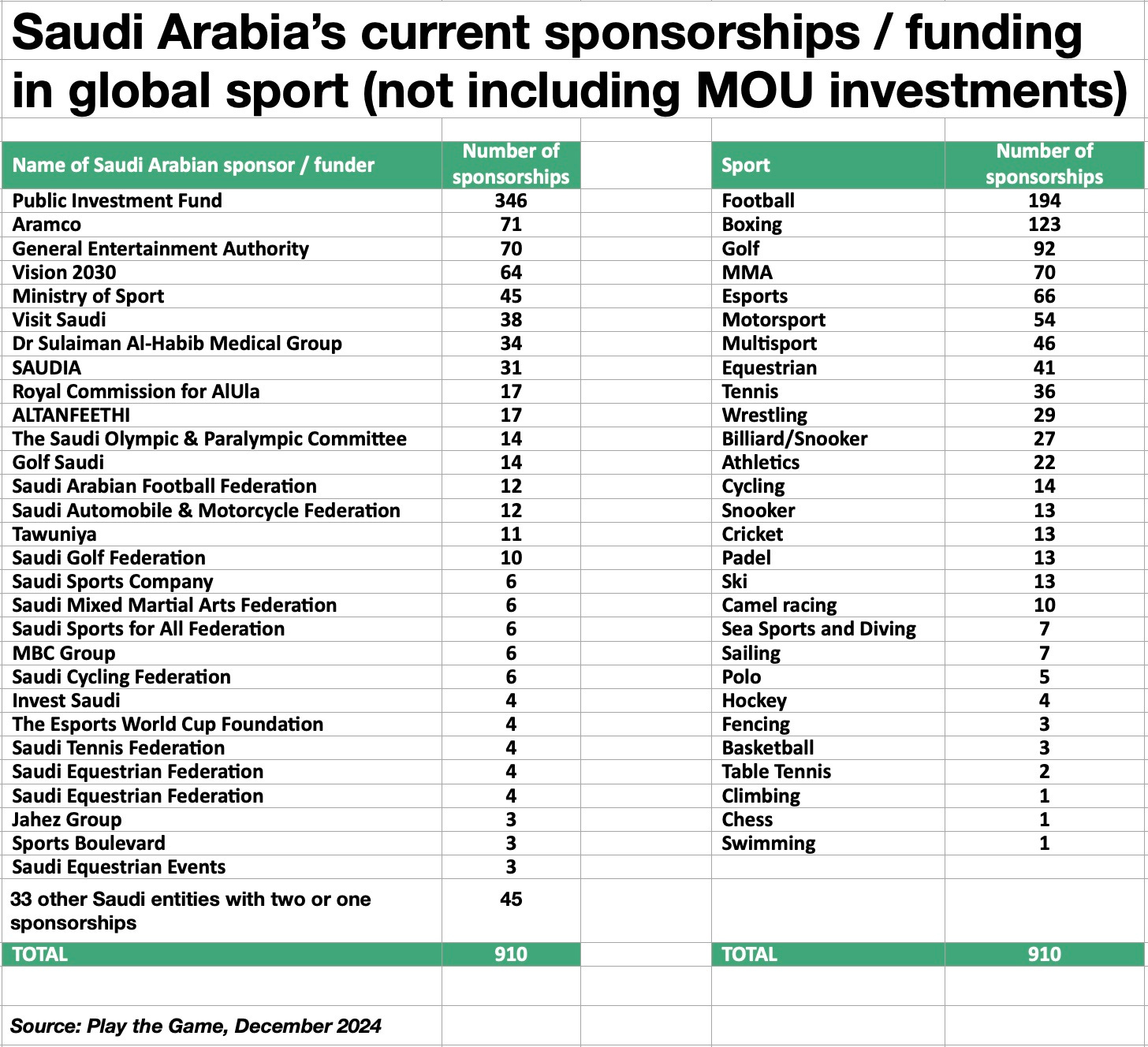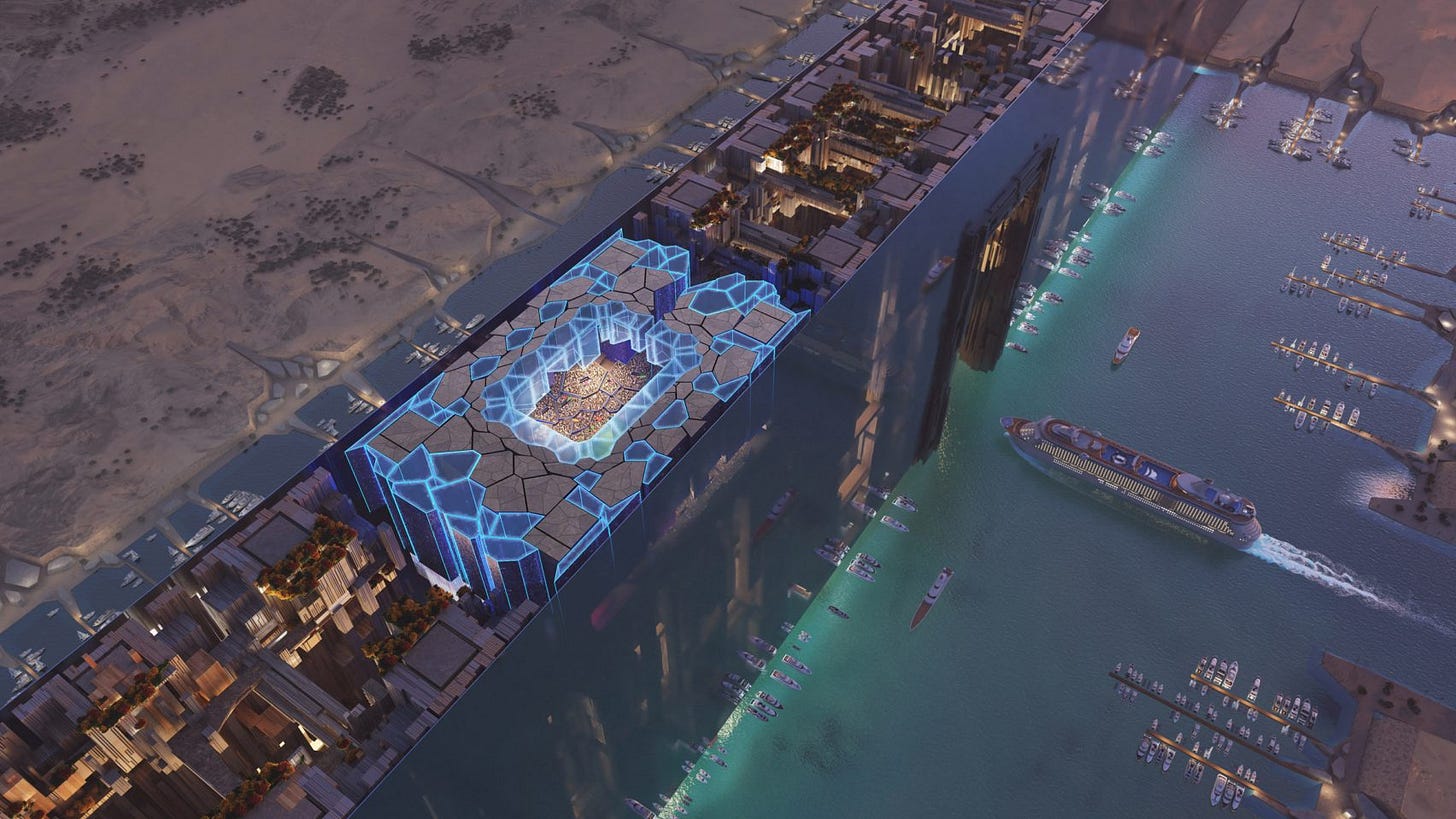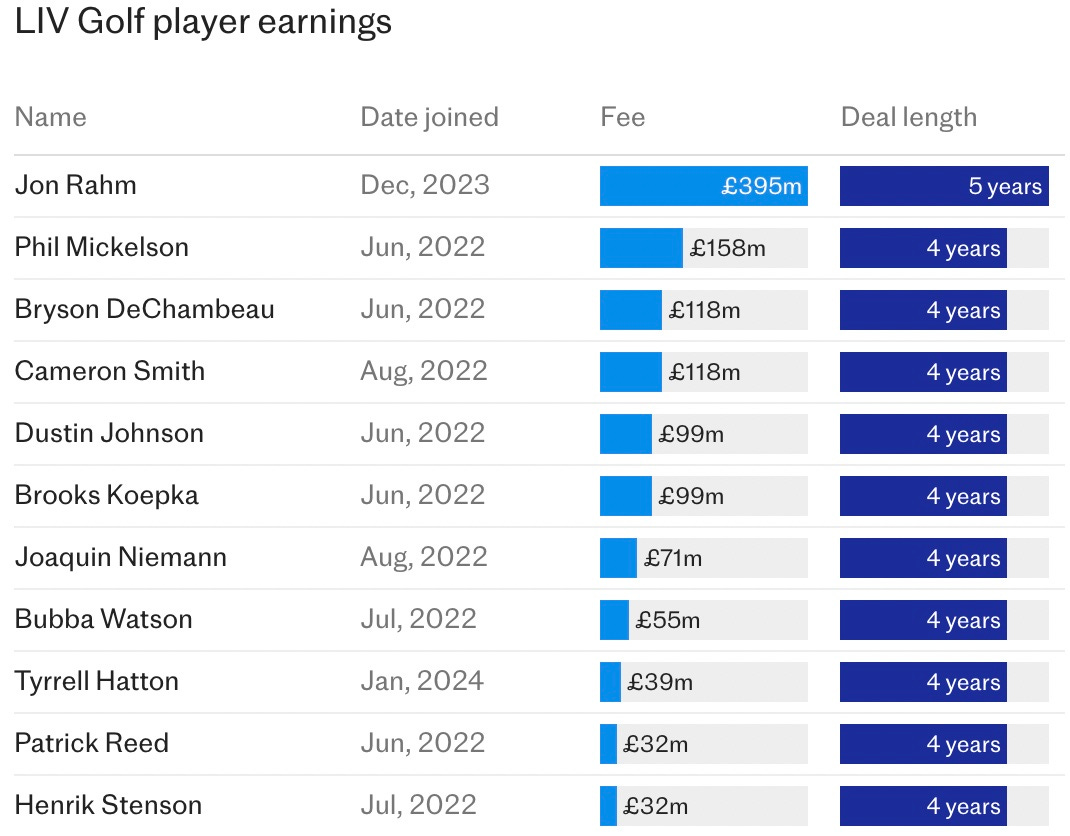REVEALED: the full scale of Saudi Arabia's takeover of sport, costing tens of billions
A new report and extensive datasets compiled by Play The Game, and made available free today, shows Saudi Arabia's growing influence, and control, of global sport
Saudi Arabia’s massive and growing influence in global sport is highlighted again today with the publication of a new report, and detailed datasets, compiled by Play The Game, that map 910 Saudi sponsorships across the sporting world.
The report, ‘Saudi Arabia’s grip on world sport’ also provides details of individuals who fill 1,412 key positions within Saudi institutions that fund sport or are developing Saudi Arabia’s influence in sport.
The report and all the datasets will be available free to download from 8pm CET, or 7pm UK time this evening, Monday 2 December.
While the report does not quantify values of the 910 sponsorships, Sporting Intelligence calculates Saudi Arabia has already spent in excess of £10bn on football, boxing, golf, MMA, Esports, motorsport, cricket and tennis alone, and probably much more.
It is hard to quantify precise sums when so many of Saudi Arabia’s deals are so opaque. Beyond the 910 sponsorships in the dataset, Saudi Arabia has 46 memorandums of understanding (MOUs) with national football associations, two more with confederations and six more with individual clubs, more of which shortly.
It is far from clear how much Saudi money, if any, is funding activities that fall within the MOUs, often with FAs from poor parts of the world.
What is abundantly clear is that by the time Saudi Arabia hosts the men’s football World Cup in 2034, Saudi Arabia will have spent umpteen tens of billions on sport, and will wield enormous power, politically as well as economically.
In many ways it already does, evidenced by the very fact it obtained the 2034 hosting rights, unopposed, after a process hugely lacking in transparency which sent the 2030 World Cup to three continents to make Saudi, in effect, the sole bidder for 2034..
“Backed by billions of dollars and a rapidly expanding network of sponsorships, partnerships, and strategic investments, the Kingdom’s ambitions have reshaped the sports world,” says Stanis Elsborg, head of Play the Game (PTG) who has co-authored the PTG report with Karim Zidan.
“Saudi Arabia’s ambitions in sport go far beyond winning games or hosting tournaments. They are part of a strategic effort to reshape the Kingdom’s global image while leveraging sport as a tool of geopolitical influence. Understanding this strategy is key to grasping what’s truly at stake.”
Here is a summary of the 910 current Saudi sponsorships, with the Public Investment Fund (PIF) funding 346 of them, followed by Aramco (71).
Saudi Arabia has long been criticised for its human rights record, and the nation’s de facto ruler, Mohammed bin Salman (MBS), has been personally implicated in the murder of journalist Jamal Khashoggi.
A report from Human Rights Watch last month also accused MBS of abusing his position via the PIF to fund projects that harm his own citizens.
FIFA and its president, Gianni Infantino, are now effectively business partners of MBS and his Saudi regime. When FIFA gave Saudi 2034 a glowing evaluation report in recent days, Amnesty International were scathing.
Steve Cockburn, head of labour rights and sport at Amnesty, said: “As expected, this review of Saudi Arabia’s World Cup bid is an astonishing whitewash of the country’s atrocious human rights record. There are no meaningful commitments that will prevent workers from being exploited, residents from being evicted or activists from being arrested.
“By ignoring the clear evidence of severe human rights risks, Fifa is likely to bear much responsibility for the violations and abuses that will take place over the coming decade. Fundamental human rights reforms are urgently required in Saudi Arabia, or the 2034 World Cup will be inevitably tarnished by exploitation, discrimination and repression.”
FIFA’s desire to get more money from Saudi Arabia was detailed in this recent piece. Saudi Arabia’s ongoing lack of concern at the deaths of thousands of migrant workers, including on 2034 projects, was detailed last month.
Saudi spending on football: we ain’t seen nothing yet
The PIF’s biggest single football project to date in cost terms has been the Saudi Pro League since the PIF bought majority control of the league’s four biggest clubs - Al-Ahli, Al-Ittihad, Al-Hilal, and Al-Nassr - in June of last year.
That quartet of clubs have spent £1bn, net, on transfer fees alone since then, and when hugely lucrative contracts for superstar foreign names are added, the most conservative estimate of PIF’s spending at those clubs so far is £2bn+.
Cristiano Ronaldo, Sadio Mane, Aymeric Laporte, Riyad Mahrez, Roberto Firmino, Ivan Toney, N’Golo Kante, Karim Benzema, Moussa Diaby, Ruben Neves, Neymar and João Cancelo are just a dozen of those lured by the prospect of huge paydays. ESPN detailed every move to the Pro League in 2023 here, with fees paid.
Saudi spending on football also includes Aramco’s $600m (£470m) four-year deal to become a “major worldwide partner” of FIFA, from 2024 to 2027 inclusive; and PIF’s majority ownership of Newcastle United. The latter has conservatively cost £500m+ so far including the £305m purchase price, extensive legal fees, contributions to the purchase of £430m of players since the takeover, and spending on Saudi sponsors at the club including shirt sponsor Sela, and airline partner Saudia.
A new stadium for Newcastle might reportedly cost between £800m and £1bn.
On the subject of stadiums, it is currently envisaged - in Saudi’s 2034 World Cup bid book - that 11 of the venues for that tournament will be new, and although the bid book makes zero reference to the cost, it will likely be astronomical.
One of those new stadiums will be part of the $20bn “Jeddah Central” urban development project. In February of this year, contracts worth $3.2bn were awarded to build the stadium, an opera house and an oceanarium as part of the project, with the stadium being the single most costly of those.
Another of the new stadiums (below) will be built 350 metres above the ground, on top of the trillion dollar mega city, The Line, and it will cost billions, not that anyone is officially putting a price tag on it. Plans were revealed in August.
Saudi Arabia’s growing influence in football politics - aside from having Infantino on side - includes those dozens of MOUs, including with the confederations that oversee the 54 nations in CAF and the 13 nations in the OFC.
Given that Saudi Arabia already wields lots of power and influence in the 47-member AFC, and has multiple sponsorships within the 41-member CONCACAF region, it has close ties with a majority of the world’s FAs.
Saudi Arabia’s 46 direct MOUs with individual nations include those with countries as diverse as Ukraine, Guyana, Brunei, the Ivory Coast, Pakistan, Singapore, Burundi, Ethiopia, Costa Rica, Iran, Syria, Somalia, Botswana, Bangladesh, Iraq, China, Liberia, Oman and Gambia. The full lists are detailed in today’s PTG datasets.
Boxing, golf, F1, cricket, tennis: another £10bn!
Saudi Arabia has spent or earmarked around £3.5bn on boxing projects, including major bouts and a proposed international league.
The PIF-funded LIV golf project, meanwhile, has already burned through £2.5bn, according to Jamie Corrigan of the The Telegraph who delivered scoop after scoop on the game’s disruptor start-up.
More than £1bn has been spent on player contracts (those worth £30m-plus listed below), with more than £750m spent in prize funds so far and hundreds of millions more on event staging, promotion and media activities.
Saudi Arabia has also spent an estimated £1bn in F1, via Aramco and other entities, and significant sums trying to get a foothold in cricket (via the ICC) and tennis (via the ATP and WTA).
Yasir Al-Rumayyan: global sport’s most powerful man?
While the Saudi takeover of global sport is being driven by MBS, who is chairman of the PIF, it is being delivered by a few select close associates, not least the PIF governor, Yasir Al-Rumayyan. PIF is among the world’s largest sovereign wealth funds, with assets of around $925m (£718bn).
Today’s Play the Game reporting notes that Yasir Al-Rumayyan holds no fewer than 22 key roles in Saudi Arabia’s burgeoning sporting empire. He is, among other things, the chairman of Aramco, and of Saudi’s largest mining company, Ma’aden, a PIF subsidiary that spends on sport.
Yasir Al-Rumayyan, spotted recently alongside US president-elect Donald Trump and Elon Musk at UFC 309 in New York, is also the chairman of Newcastle United, and effectively runs LIV Golf, and is chairman of Riyadh Air - a PIF-owned airline which sponsors Atlético Madrid, the WTA Finals, and CONCACAF - and on the board of directors of The Saudi Olympic & Paralympic Committee. And on and on.
As today’s Play The Game report says: “An element of Saudi Arabia’s sports strategy that is often overlooked is the defining feature of its key figures: the extraordinary decision-making power they wield.
“Unlike many of their counterparts in global sports, Saudi sports leaders hold multiple roles that combine leadership in the sports sector with high-ranking positions within the state apparatus, granting them unparalleled political and financial authority.
“This duality—bridging state governance and sports leadership—gives them a distinct advantage in influencing negotiations, securing agreements, and steering the Kingdom’s strategic agenda.
“By holding senior roles in sports, key ministries, the sovereign wealth fund, and major state-owned enterprises, their influence transcends traditional sports administration and enables them to leverage immense state resources and extensive political networks to achieve their objectives.
“Backed by state power and vast financial resources, these figures are uniquely positioned to speak for the Kingdom. For instance, Al-Rumayyan’s roles as governor of the Public Investment Fund and chairman of Aramco—alongside his involvement in Saudi sports—allow him to seamlessly transition between acting as a sports leader, a financial heavyweight, or a state representative, depending on the context.
“This adaptability enables Saudi leaders to exert influence in ways which are unattainable for conventional sports leaders whose authority is typically confined to federations or organisations. For them it is virtually impossible to compete with such a well-sourced and state-backed approach.”
This piece is one of numerous articles on this site that is free to read for everyone. But the work of the Sportingintelligence Substack, not least investigative pieces on the smoke & mirrors of Man City’s legal battles, the true scale of match-fixing in England, the ‘Skyfall’ series on drugs in British cycling, part 1 of 5 here, match-fixing in tennis, and much else, is unsustainable without paid subscriber support. Try it and read everything. There’s a vault of more than 1,700 pieces on his dating back to 2010. And if you’re not getting value for money, unsubscribe. Thanks!







